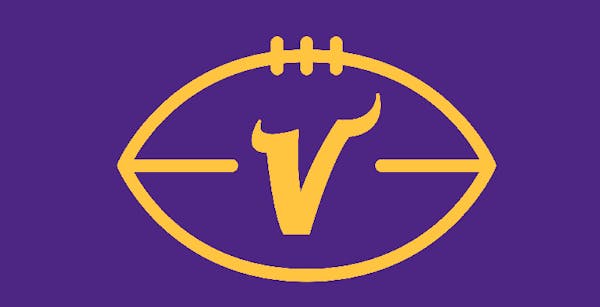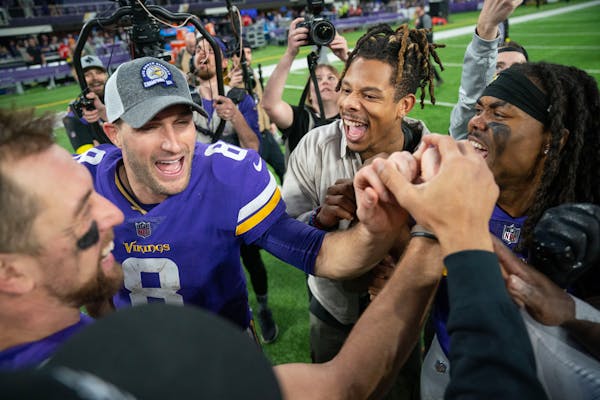Chandon Sullivan looked exhausted and admitted as much.
"I feel like I went through every emotion in this game," the cornerback said in a celebratory Vikings locker room Saturday.
Somewhere inside U.S. Bank Stadium, the officiating crew that worked the largest comeback in NFL history probably felt a different emotion: relief.
Relief that two egregious calls did not prevent the Vikings from claiming the NFC North title in a 39-36 win over the Indianapolis Colts, a thriller that was almost too absurd to describe.
Sullivan had two fumble returns for touchdowns wiped out by A) an overly quick whistle and B) a clear missed call.
On a day when emotions ran hotter than a pot of boiling water, those two plays sent Vikings players, coaches and fans into full meltdown mode as a comeback seemed to hang in the balance because of those reversals.
"That was fascinating," veteran safety Harrison Smith said sarcastically of those officiating errors.
My long-standing stance as a sportswriter is to avoid commenting on officiating because bad calls/favorable calls tend to even out over time. Mistakes are inevitable when human judgment is involved. Blaming outcomes on officiating is an easy and convenient way to deflect accountability.
Both teams benefited from questionable calls Saturday.
However, those two plays involving Sullivan cannot be dismissed as normal give-and-take. They became a major part of the game narrative after directly costing the Vikings 14 points in what looked more like poor recognition and handling of game situation than iffy judgment calls.
The first play happened in the second quarter with the Vikings trailing 23-0. Michael Pittman Jr. caught a short pass near the sideline. Sullivan grabbed him, stripped the ball out, scooped it up and ran 38 yards for an apparent touchdown. However, an official ruled that Pittman's forward progress had stopped and blew the play dead, which meant it was not reviewable.
I asked game referee Tra Blake and Walt Anderson, the NFL's senior vice president of officiating, in a pool report interview how they determine when forward progress ends. Runners often receive more leeway when fighting for yards.
"Forward progress ends once the runner is not making progress towards his goal line any longer," Blake said. "Once we determine that, the play is over."
Sullivan's perspective: "That's a tough situation because he was still fighting for yardage, and he wasn't down. Let's say we would have stopped and just let him go. He would have got the first down."
Instead of trailing 23-7, the Vikings fell behind 30-0 after Kirk Cousins threw a pick-six on the ensuing possession.
Sullivan's second nullified scoop-and-score cost the Vikings a chance to tie the score in the fourth quarter. Trailing 36-28 with 3½ minutes remaining, Indianapolis running back Deon Jackson ran into a pile of bodies and had the ball knocked out of his hands by Za'Darius Smith.
An official blew his whistle under the belief that Jackson was down by contact, even though he was still standing up in the pile when the ball came out.
Sullivan saw the ball on the ground at the 39-yard line, picked it up and ran toward the end zone, as teammates began reacting demonstrably when they realized the play had been stopped.
The replay booth noticed a fumble had occurred and awarded the Vikings the ball at the spot, but the touchdown did not count because the play had been declared dead.
"All we could do was give Minnesota the ball at the spot of the recovery," the NFL's Anderson said.
The quick whistles were unnecessary because that's why replay is available. Let plays play out.
Sullivan lost his composure and threw his helmet onto the field after the announcement, drawing an unsportsmanlike conduct penalty.
Veteran cornerback Patrick Peterson was visibly upset, too.
"I'm like, come on, ref, you can't do it to us twice, man," Peterson said.
Said linebacker Eric Kendricks, "It ticked us off just enough."
Their response is how the 1,000th game in team history ultimately will be remembered. That the Vikings overcame a disastrous first half and a deficit that had never been erased in league history to win the division title. The NFL avoided a nightmare scenario in the process.

Scoggins: Vikings' Smith is 'Hitman' on field and man of many talents off

Football Across Minnesota: Meet Cam, the can-do star from down south

Scoggins: Getting even meant getting two picks vs. Edina

Scoggins: Among pantheon of Gophers running backs, Taylor has his own special traits



